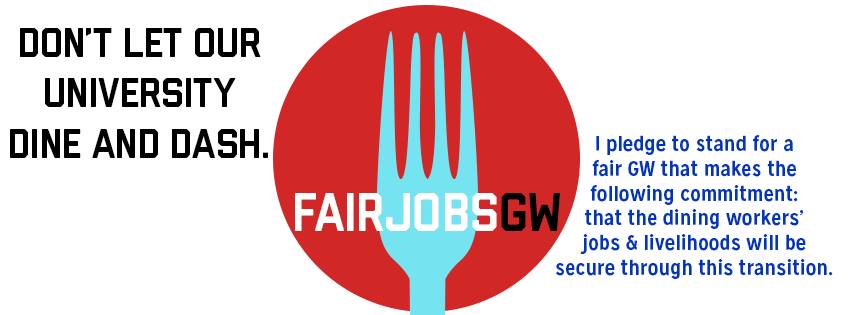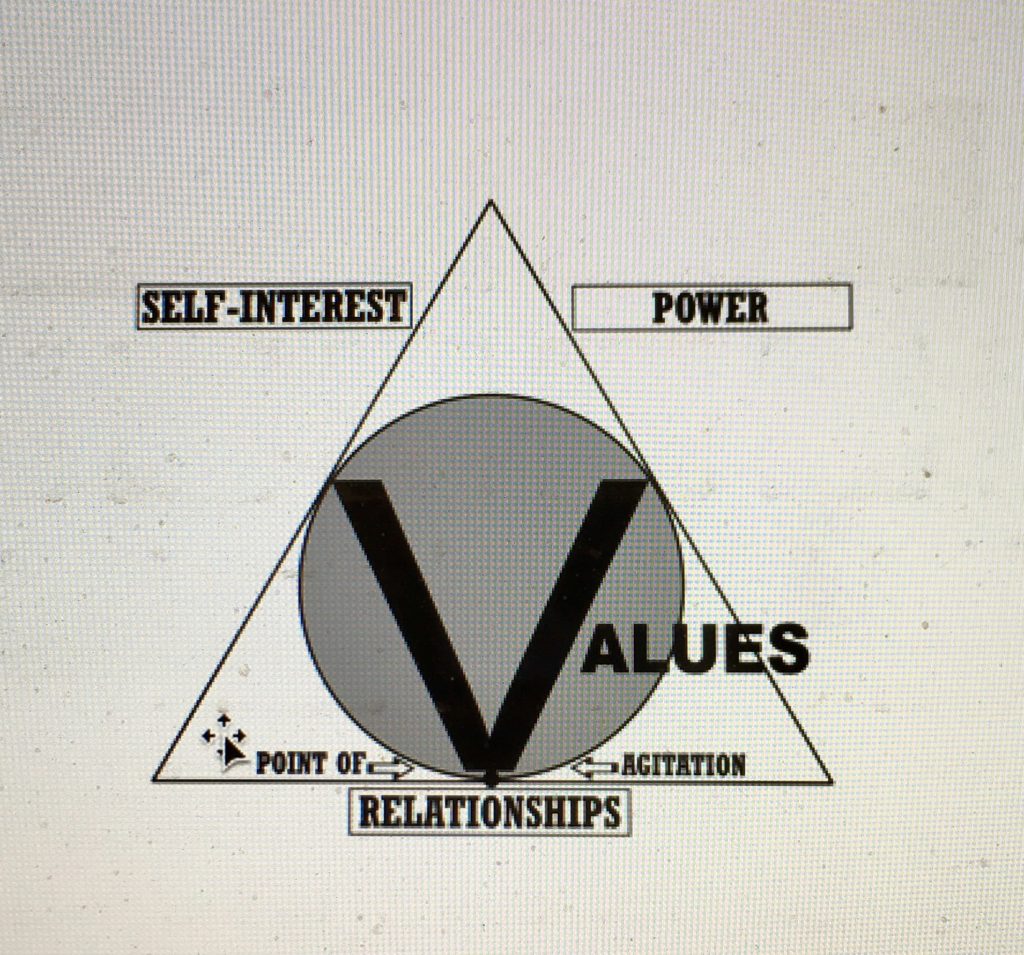
Dining hall workers have never had it easy at the George Washington University, but in September 2015, the University announced things were going to get worse for those workers. In response, George Washington University’s Progressive Student Union organized a Fair Jobs GW campaign, using the Jobs with Justice values triangle as an organizing tool.

First, we were clear on our values: we were an organization that worked to build student and worker power on campus, and valued dignity and respect for those who were working and learning at the university.
Second, we were building relationships with other people and organizations that shared our values: other students and student organizations, staff members, faculty members, university-employed workers, and workers in outsourced positions, faculty and staff associations and unions.
We were clear that it was in all of our collective self interests, the tangible manifestation of our values, to make demands that administrators commit to retention of workers, cease outsourcing, and stop the increasing precarity in staff and adjunct faculty employment.
Bringing together different groups — students, faculty, staff — built the power that we needed to make those demands of administration. If power is organized people and organized money, we didn’t have organized money, but we could organize people. Even so, we had nowhere near enough power to fight GW’s plan to lay off cafeteria workers.
So we went back to the values triangle. To build the necessary power, we had to use agitation to find others with shared values, and through accountable, reciprocal, and transparent relationships work to connect values to our broader self-interest, around specific events and issues. Effective one-on-one agitation meets people where they’re at.
We started agitating harder than we had before – reaching out to other students, understanding their values, and challenging them to take action in alignment with their self-interest. We tripled the size of our coordinating committee, going from seven or eight members to over 25 in order to effectively run a campus-wide campaign. We built relationships and connected those values of dignity and respect to others’ self interest. In addition to fighting for basic dignity and respect that was not being afforded to workers who had spent anywhere from ten to 50+ years as employees of the university dining program, this was a fight against the corporatization of higher education. As students, it was in our self-interest to ensure the jobs at the university – be they dining, facilities, staff, adjuncts, already outsourced or not – be high quality jobs that allow anyone in those positions to live fulfilled lives. This in turn impacts the quality of higher education as a whole, and the quality of jobs many students work as employees of the university as well. Allowing any position to be outsourced or restructured with little to no input from students sets a dangerous precedent, one that has emboldened administrators at GWU and elsewhere to make damaging cuts to programs like the Music Program or staff in the University Library with relatively little fear of pushback.
With an expanded coordinating committee to run the campaign, we were able to rally the support of over 2,000 students, staff, faculty, and workers at the university to demand full retention of all workers employed in the university dining program with the Fair Jobs GW campaign. Over 80 people marched on the administration building to deliver these demands along with the 2,000 signed pledges, including newly elected members of the Student Association. Ultimately, administrators at GW ran out the clock on students, holding their final closed-door meetings in late July to avoid mass protest. The company that was awarded the new dining contract – Restaurant Associates – made concessions to have GW dining workers placed in other locations of theirs around the city. Of the workers that weren’t placed at other positions within the university dining program, many were relocated to other positions throughout D.C. The campaign wasn’t a clear cut victory, but it did provide an indication to the university that the community would not idly watch as administrators pulled the carpet out from underneath those who work and learn there. It created lasting relationships between students, workers, staff, and faculty that endure and will be ready for the next fight. And it agitated people, allowing others to stop believing the myth of their own powerlessness, which served as a mask for our unwillingness to sit with thoughts and feelings that challenge us.
Agitation, ultimately, is about encouraging others to find the alignment of their values and their self interest – about being clear on their values to then inform where their self interests lie – thinking, how can we motivate ourselves and others in our community to take action to achieve a shared vision for a more just and inclusive future? Start with the values triangle and get organizing.
(Photo Credit: Fair Jobs GW / Facebook) (Image Credit: Jobs with Justice)